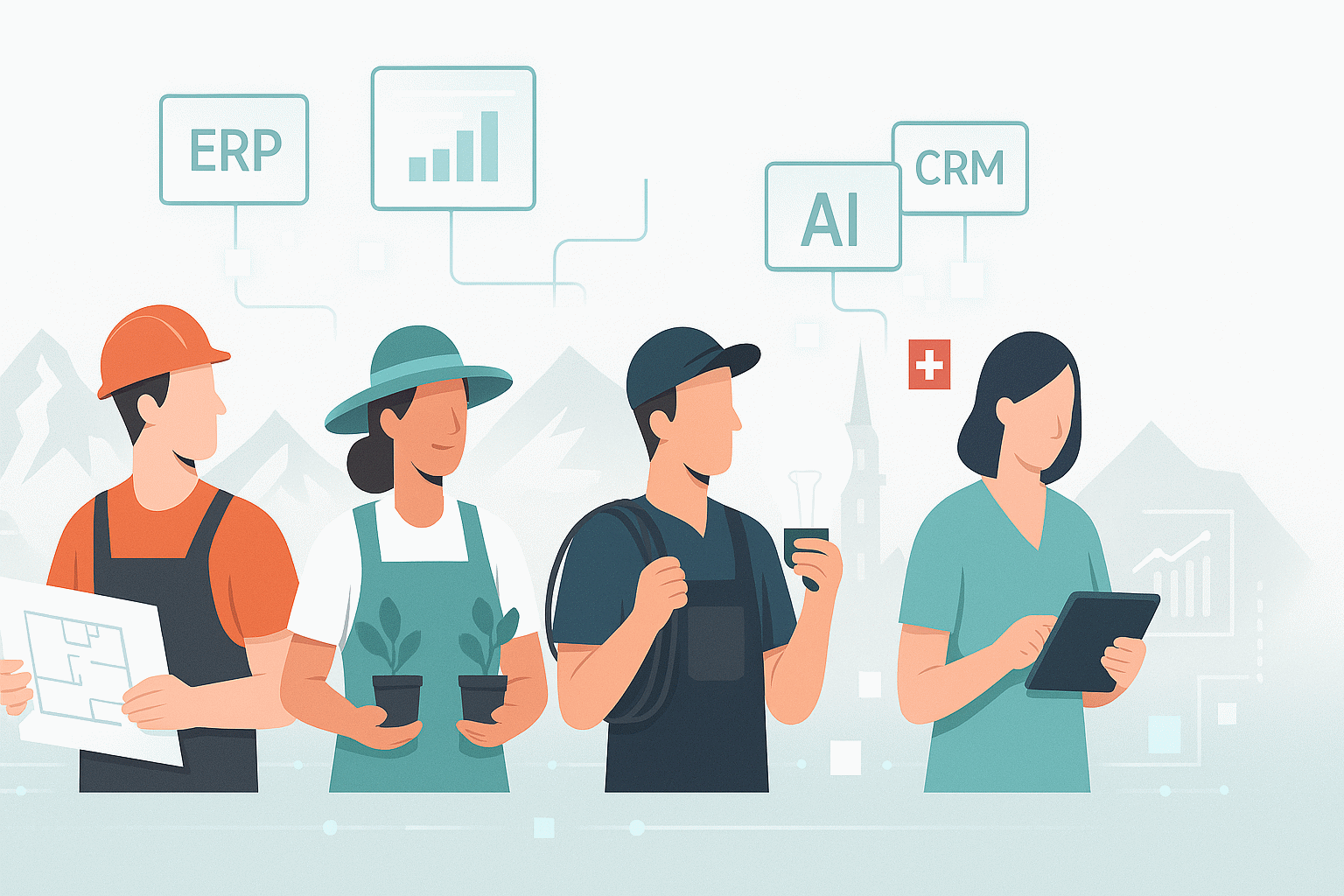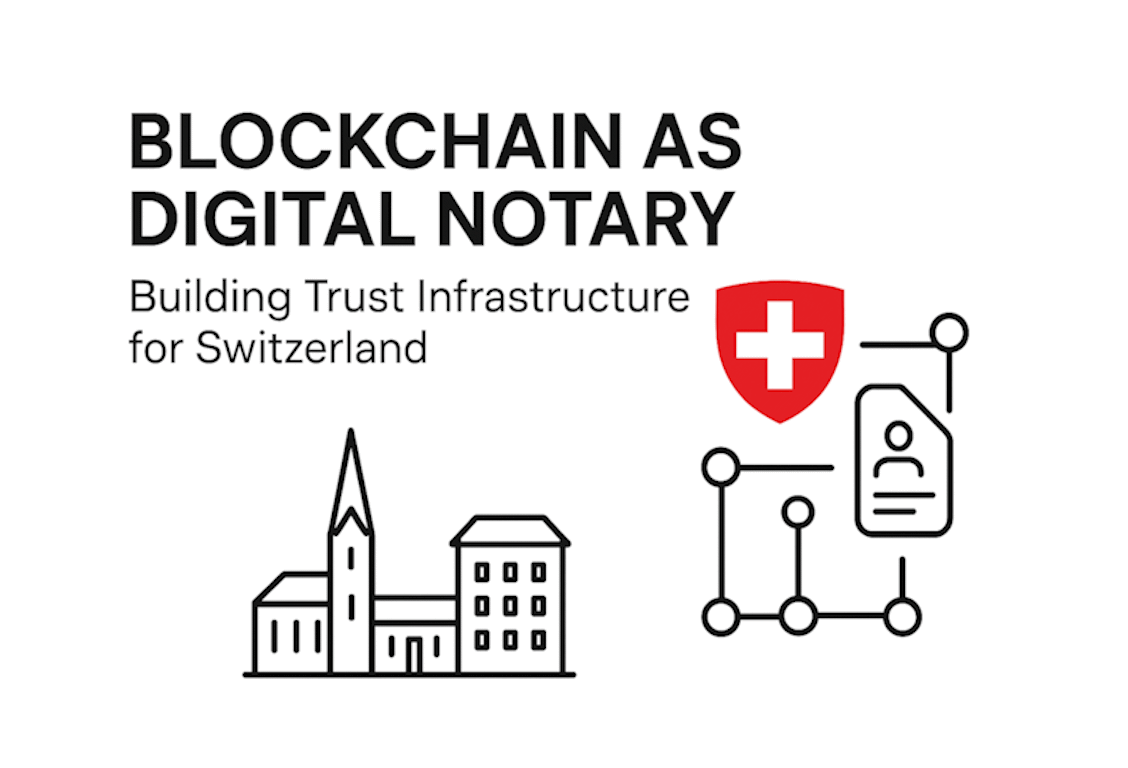How Switzerland’s SMEs can embrace digitalisation pragmatically while staying true to values of precision, reliability, and trust.
Introduction: SMEs as Switzerland’s Backbone
Small and medium‑sized enterprises (SMEs), often referred to as the Mittelstand, are the backbone of Switzerland’s economy. They represent more than 99% of all businesses, employ two‑thirds of the workforce, and drive innovation across industries.
These SMEs are not just high‑tech manufacturers or exporters. They include builders, gardeners, electricians, and local service providers — the businesses that keep Swiss towns and cities running smoothly. Each of them faces different challenges and is at a different stage of digitalisation. Some are still moving from paper invoices to digital systems, while others are exploring advanced analytics and AI.
The Swiss Context: Precision, Reliability, Trust
Switzerland’s reputation rests on three pillars: precision, reliability, and trust. These values are embedded in how SMEs operate — whether it’s a builder delivering projects on time, a gardener maintaining landscapes with care, or an electrician ensuring safety and compliance.
Digitalisation should reinforce these values, not undermine them. A well‑designed transformation strengthens precision through accurate data, enhances reliability through consistent processes, and deepens trust by making operations transparent and compliant.
Practical Pathways for Digitalisation
1. Modular ERP Systems
ERP (Enterprise Resource Planning) is simply a system that helps a business manage its core operations — things like inventory, finances, payroll, and scheduling — all in one place.
- Start small, scale later: SMEs don’t need to adopt a giant ERP system. Modular solutions allow them to digitize one function at a time — invoicing today, project scheduling tomorrow.
- Example: A builder digitizes project planning first, reducing errors and improving delivery times, before expanding into finance and HR modules.
2. CRM for Customer Relationships
CRM (Customer Relationship Management) is a tool that helps SMEs keep track of their customers, projects, and communications.
- Practical use: A gardener can log client preferences (e.g., seasonal planting schedules), track invoices, and send reminders for upcoming maintenance.
- Benefit: Builds stronger customer relationships and ensures no detail is forgotten.
3. Secure Cloud Adoption
- Flexibility and resilience: Cloud solutions reduce upfront IT costs and provide scalability.
- Swiss concerns addressed: Data sovereignty and compliance with Swiss/EU regulations can be managed through hybrid cloud models, keeping sensitive data on local servers while leveraging cloud for less critical workloads.
- Example: An electrician stores compliance certificates securely in the cloud, accessible to both clients and regulators.
4. Digital Invoicing & Payments
- Efficiency gains: Digital invoicing accelerates cash flow, reduces administrative errors, and improves transparency.
- Compliance ready: Aligns with Swiss and EU e‑invoicing standards, making audits smoother.
- Example: A gardener issues e‑invoices, cutting payment delays and strengthening relationships with clients.
5. Compliance Automation in Healthcare
Healthcare SMEs face strict regulations around patient data, billing, and medical standards. Automating compliance reporting means using digital systems to automatically generate the required reports for regulators — instead of staff manually compiling them.
- Example: A medical practice uses software that automatically logs every treatment, anonymizes patient data, and produces compliance reports for health authorities.
- Benefit: Saves staff time, reduces errors, and ensures the practice always meets legal obligations.
Moving Beyond Basics: AI, Data‑Driven Growth, and Marketing
For SMEs already past the first steps, the next frontier is using data intelligently and building a strong digital presence.
- Consolidating Existing Systems: Integrating ERP (operations), CRM (customer relationships), and invoicing systems creates a unified view of the business.
- AI‑Driven Insights: Machine learning can identify customer trends, optimize supply chains, and predict demand.
- Digital Marketing Expansion: SMEs can leverage AI‑powered analytics to target customers more precisely, measure campaign effectiveness, and expand reach without inflating budgets.
- Creating a Company Brand Easily: Digitalisation also means presenting your business professionally online. A modern website, clear contact details, and ready‑made templates for outreach give SMEs instant credibility. Just as this website demonstrates, a professional digital presence signals reliability and makes it easy for customers to connect.
- Practical example: A local electrician consolidates project and client data, then uses AI to forecast demand for seasonal services. At the same time, a professional website with clear contact details and service descriptions helps attract new customers and builds trust.
Why Parowls Software is Ideally Placed to Assist
Parowls Software GmbH brings cross‑industry and cross‑size experience, having worked with both large institutions and smaller enterprises. This breadth allows us to:
- Understand the unique challenges SMEs face at different stages of digitalisation.
- Design pragmatic, modular solutions that consolidate existing systems rather than replace them outright.
- Help SMEs unlock the value of their data, applying AI and analytics to drive growth in marketing, operations, and compliance.
- Support SMEs in creating a professional brand presence — from websites and contact structures to digital marketing strategies — ensuring they look as reliable online as they are offline.
By combining technical expertise with strategic consulting, Parowls ensures that digitalisation is not just a technical upgrade but a business transformation aligned with Swiss values.
Conclusion: Pragmatic Digitalisation for Enduring Competitiveness
For Swiss SMEs — whether builders, gardeners, electricians, or healthcare providers — digitalisation is not about chasing trends or adopting flashy technologies. It is about embedding Swiss values into modern systems.
Whether digitizing invoices or deploying AI analytics, SMEs can start from their current stage and move forward step by step. With the right guidance, digitalisation becomes a carefully measured journey — one that consolidates existing strengths, expands intelligently, and builds trust for the future.
Parowls Software is ready to help SMEs at every stage of this journey, ensuring that digitalisation is pragmatic, precise, and aligned with Switzerland’s enduring reputation for reliability and trust.



